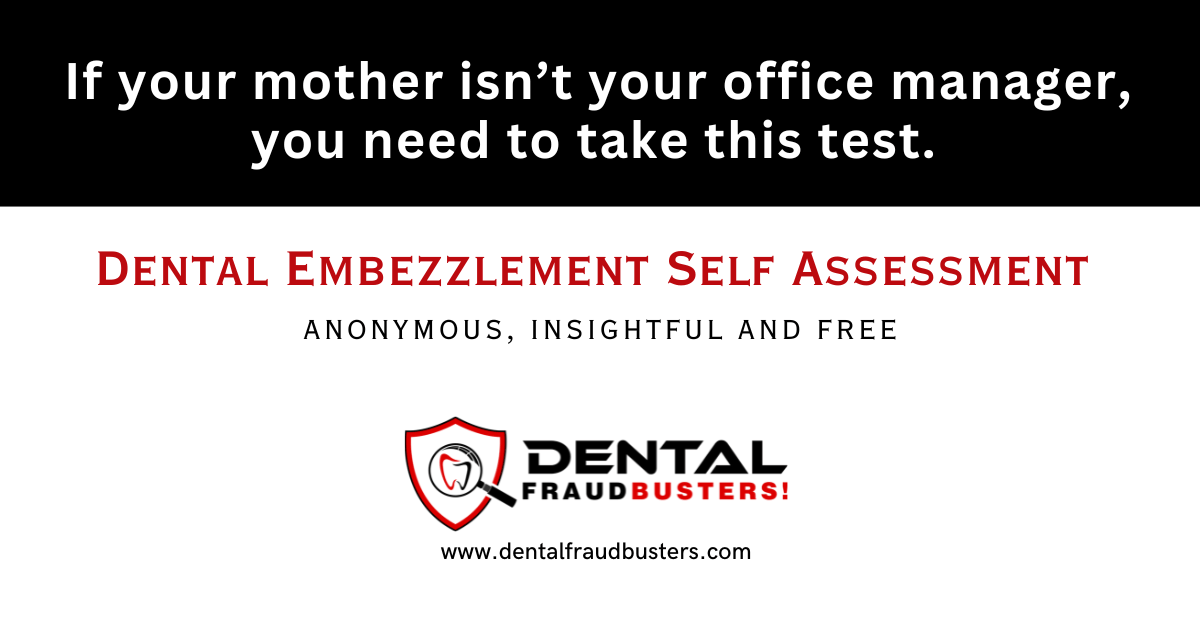Compulsive Gambling and Embezzlement
Objective: To understand the connection between problem gambling and embezzlement
WOMEN DOMINATE DENTAL EMBEZZLEMENT CASES
- Most dental embezzlers are women – not because women are inherently more likely to embezzle, but because of occupational differences in the workplace.:
- Women disproportionately occupy front-office roles in dental practices – receptionists, billing coordinators, and especially office managers.
- These positions often involve handling money, insurance claims, and financial records, giving them access and opportunity.
EMBEZZLEMENT REQUIRES THREE ESSENTIAL INGREDIENTS
(1) Opportunity, (2) Pressure, and (3) Rationalization
The compulsion to gamble can surpass ethical and moral boundaries, even in people who were previously law-abiding. Employees are prone to embezzle when all three of these conditions are satisfied.
- They have an opportunity to embezzle (trusted employee in control of finances)
- They feel intense pressure to obtain money (which could be as a result of their gambling.
- They rationalize their stealing. (see: Techniques of Neutralization)
GAMBLING PREVALENCE AND EMBEZZLEMENT
- 8% of U.S. adults (approx. 20 million people) reported experiencing problematic gambling behavior “many times” in the last year.[1]
- Roughly 50% of problem gamblers commit crimes, and it’s often as a direct result of their gambling. These offenses are typically non-violent white-collar crimes such as fraud, forgery, embezzlement, larceny and workplace theft.[2]
MORE WOMEN GAMBLE THAN EVER BEFORE
- Rising Participation: More women are engaging in gambling than ever before. In the U.S., about 36% of women participate in some form of gambling, and 7.8% meet the criteria for problem gambling.[3]
- Highly Addictive: Women tend to prefer games like slots, bingo, video poker, and lottery, which are fast-paced and often used as emotional escapes. These types of games can be highly addictive due to their rapid reward cycles. [4]
- Faster Progression to Addiction: Research suggests that women may progress from casual gambling to problem gambling more quickly than men, especially in online environments. This is sometimes referred to as the “telescoping effect.”[5]
GAMBLING ADDICTION IN THE WORKPLACE
Detecting a gambling addiction in the workplace can be tricky, especially because many symptoms can overlap with other personal or professional problems.
Here are some behaviors that could indicate an employee has a gambling problem:
- Frequent requests for pay advances or loans from coworkers.
- Unexplained absences or frequent tardiness, especially around payday.
- Mood swings, irritability, or anxiety, particularly after breaks or lunch hours
- Decline in work performance
- Disheveled appearance or signs of stress, such as fatigue or distraction
- Taking sudden, unplanned vacations or disappearing during work hours
- Borrowing money or selling personal items at work
- Conflicts with colleagues or unusual secrecy about personal life
WHY IT MATTERS
Gambling addiction can lead to serious personal consequences like financial hardship, strained relationships and embezzlement.
Is your practice at risk of being embezzled? Scroll down to take the dental embezzlement risk self assessment.
[1] NGAGE 3.0 (2024) – National Council on Problem Gambling
[3] Women and Gambling: Female Betting Stats & Addiction Rates
[4] Women and Gambling: Female Betting Stats & Addiction Rates
[5] The Rise in Gambling Addiction Among Women
Red flags can be significant in uncovering financial misconduct.
A staggering 85% of embezzlement cases involved at least one of the Top Six embezzlement red flags.
CLICK ON THE IMAGE TO TAKE THE ASSESSMENT


